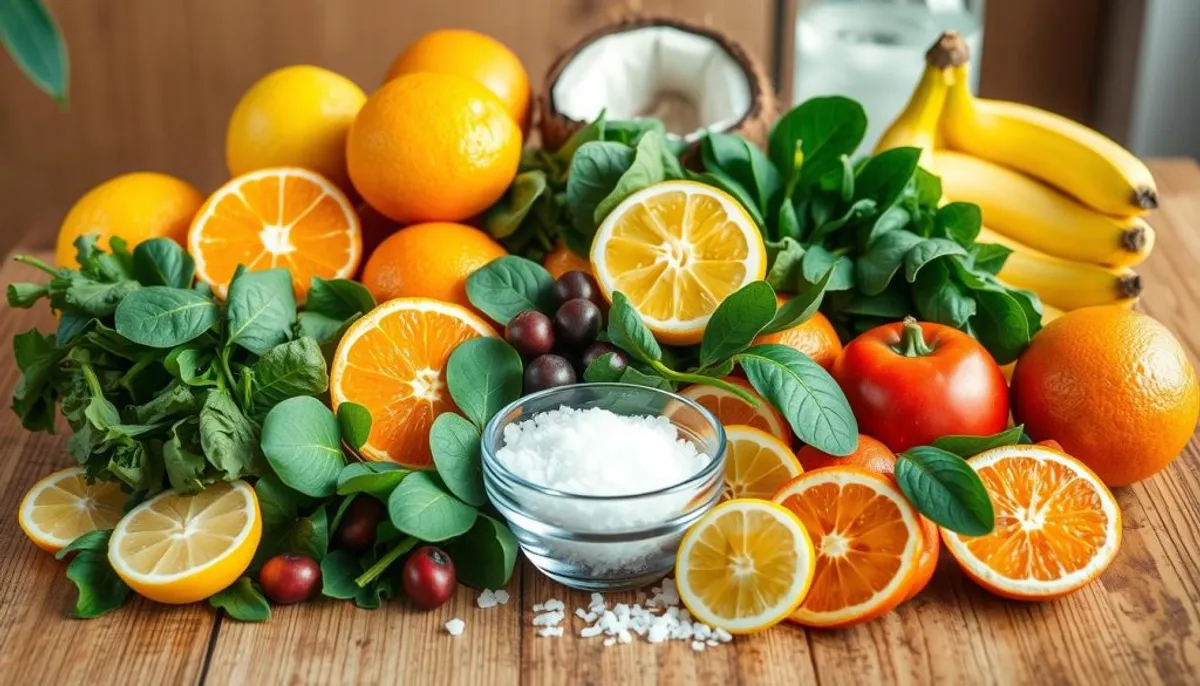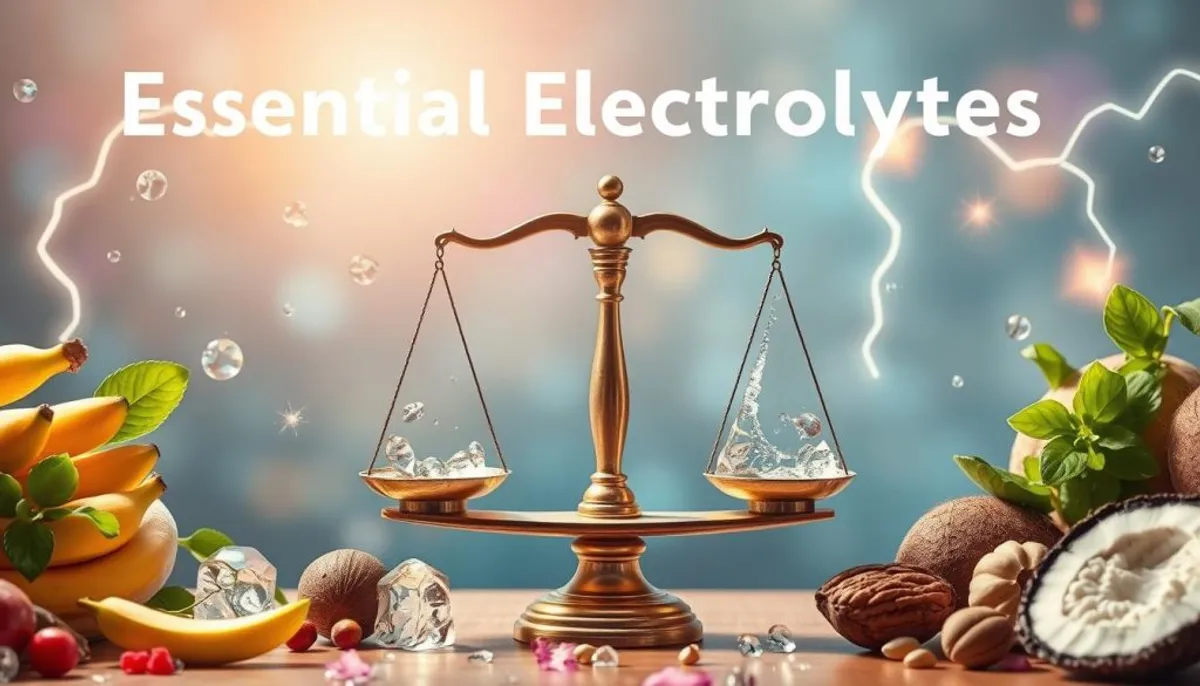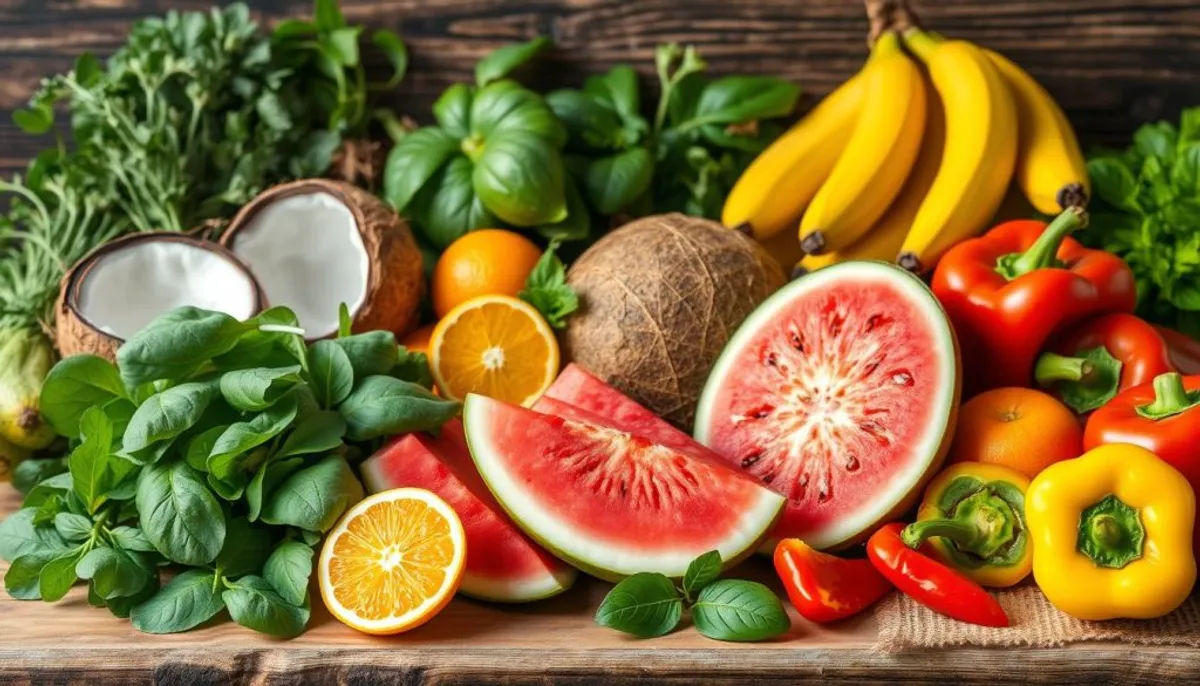Electrolytes are tiny powerhouses that keep our bodies running smoothly. These minerals play a crucial role in maintaining our health and well-being. Did you know that adults’ bodies are about 60% water? That’s where electrolytes come in, helping to balance this internal ocean.
Sodium, potassium, calcium, and magnesium are some of the key players in the electrolyte game. They work tirelessly to regulate nerve and muscle function, hydrate our bodies, and even help rebuild damaged tissue. Without proper electrolyte balance, we might face issues ranging from muscle cramps to irregular heartbeats.

Our bodies need a delicate balance of these minerals to function optimally. For instance, sodium is the most abundant electrolyte ion in our body, while potassium is crucial for heart function. Calcium helps with muscle control and nerve signal transmission, and magnesium is essential for brain and muscle function.
Key Takeaways
- Electrolytes are vital minerals that carry electric charges in our bodies
- Common electrolytes include sodium, potassium, calcium, and magnesium
- They regulate nerve and muscle function, hydration, and tissue repair
- Proper electrolyte balance is crucial for overall health
- Imbalances can lead to various symptoms and health issues
- Electrolytes can be obtained through diet and sometimes supplements
What Are Electrolytes and Why Are They Important?
Electrolytes are vital components in our bodies, influencing numerous critical functions. These small, charged particles are essential for fluid balance and supporting essential bodily processes. Exploring what electrolytes are and their significance for our health is imperative.
Definition of Electrolytes
Electrolytes are minerals found in our blood and other bodily fluids, carrying electrical charges. The primary electrolytes include sodium, potassium, calcium, magnesium, chloride, phosphate, and bicarbonate. These minerals dissolve in water, creating a solution that conducts electricity. This is crucial for various bodily processes.
How Electrolytes Function in the Body
Electrolytes are crucial for numerous bodily functions. They regulate fluid balance, support muscle and nerve function, and facilitate nutrient transport. These charged particles also contribute to maintaining healthy bones and teeth, controlling blood pressure, and regulating heart rhythm.
The balance of electrolytes in our bodies is delicate. Intense exercise, severe vomiting or diarrhea, and certain medical conditions can disrupt this balance. An imbalance can lead to various health issues, affecting our bodily functions.
| Electrolyte | Normal Range | Low Level Condition | High Level Condition |
|---|---|---|---|
| Sodium | 135-145 mmol/L | Hyponatremia (<135 mmol/L) | Hypernatremia (>145 mmol/L) |
| Potassium | 3.6-5.5 mmol/L | Hypokalemia (<3.6 mmol/L) | Hyperkalemia (>5.5 mmol/L) |
| Calcium | 8.8-10.7 mg/dL | Hypocalcemia (<8.8 mg/dL) | Hypercalcemia (>10.7 mg/dL) |
| Magnesium | 1.46-2.68 mg/dL | Hypomagnesemia (<1.46 mg/dL) | Hypermagnesemia (>2.68 mg/dL) |
Understanding the role of electrolytes in our health is essential. By maintaining proper electrolyte balance through diet and hydration, we support our body’s vital functions and overall well-being.
Key Electrolytes You Need to Know
Electrolytes are essential for our bodily functions. We will examine the four primary electrolytes crucial for our health and well-being.
Sodium
Sodium is vital for maintaining fluid balance and facilitating nerve signaling. It enables muscle contraction and regulates blood pressure. Most Americans, though, exceed the recommended 2,300 mg daily intake. Sources include table salt, pickled foods, and cheese.
Potassium
Potassium is key for regulating heartbeat and supporting muscle function. It aids in nutrient uptake into cells and counterbalances sodium’s effects. Rich sources include bananas, avocados, and sweet potatoes.
Calcium
Calcium is crucial for building strong bones and teeth. It also aids in muscle contraction and nerve function. Excellent sources include dairy products, fortified alternatives, and leafy greens.
Magnesium
Magnesium is vital for energy production and supports muscle and nerve function. It also contributes to bone health. Seeds, nuts, and spinach are rich in magnesium.
| Electrolyte | Function | Food Sources |
|---|---|---|
| Sodium | Fluid balance, nerve signaling | Table salt, pickled foods |
| Potassium | Heart regulation, muscle function | Bananas, avocados |
| Calcium | Bone strength, muscle contraction | Dairy, leafy greens |
| Magnesium | Energy production, nerve function | Seeds, nuts, spinach |
It is crucial to maintain a balance of these electrolytes for optimal health. A diet rich in fruits, vegetables, and lean proteins can help meet your electrolyte needs.
Benefits of Maintaining Proper Electrolyte Balance
Electrolyte balance is vital for health and peak performance. These minerals are essential for various bodily functions.
Hydration and Performance
Electrolytes are crucial for hydration. They aid in fluid retention, preventing dehydration during intense activities. For every hour of exercise, up to 2 quarts of fluid can be lost. Proper electrolyte balance ensures hydration, enhancing performance and endurance.
Muscle Function and Cramping
Electrolytes like sodium, potassium, and magnesium are vital for muscle function. They prevent cramping and support muscle contractions. Magnesium, in particular, extends endurance in sports. Maintaining the right balance keeps muscles moving smoothly and reduces muscle cramp risk.
Nervous System Support
Your nervous system relies on electrolytes for proper function. Sodium, potassium, and calcium facilitate electrical impulses between nerve cells. This balance is essential for maintaining normal heart rhythm and supporting nervous system health.

- Consume fruits and vegetables rich in electrolytes
- Drink sports drinks during prolonged physical activity
- Aim for 6-12 ounces of fluid every 20 minutes during sports
- Choose sports drinks with about 200mg of salt per 16-ounce serving
While sports drinks are beneficial during intense exercise, be cautious of their sugar content. Excessive consumption, even when not active, can result in unwanted calorie intake.
Signs of Electrolyte Imbalance
Identifying the signs of electrolyte imbalance is vital for health maintenance. Such imbalances can cause a spectrum of symptoms, from mild to severe. We will examine the primary indicators and the underlying causes.
Symptoms to Watch For
Electrolyte imbalance symptoms are diverse. Common signs include muscle cramps, fatigue, and unexplained weakness. You might also experience headaches, nausea, or confusion. In severe cases, irregular heartbeat or seizures may occur.
- Muscle cramps and weakness
- Fatigue and low energy
- Headaches and nausea
- Confusion or dizziness
- Irregular heartbeat
Causes of Imbalance
Several factors can cause electrolyte imbalance. Dehydration, often due to intense physical activity, is a primary cause. Prolonged vomiting or diarrhea also rapidly depletes electrolytes. Certain medications, notably diuretics, can affect levels. Kidney problems and overhydration are additional causes.
| Electrolyte | Normal Range (Adults) | Common Causes of Imbalance |
|---|---|---|
| Sodium | 136-145 mEq/l | Dehydration, overhydration |
| Potassium | 3.6-5.5 mEq/l | Kidney issues, excessive sweating |
| Calcium | 9-11 mg/dl | Vitamin D deficiency, kidney disease |
| Magnesium | 1.5-2.5 mEq/l | Malnutrition, certain medications |
If you experience persistent symptoms of electrolyte imbalance, seek medical attention. Early detection and treatment can prevent more serious health issues and ensure your body maintains optimal function.
Natural Sources of Electrolytes
Maintaining proper electrolyte balance is crucial for our body’s functions. Luckily, many foods are rich in natural electrolytes. Let’s explore some excellent sources to keep you hydrated and healthy.
Fruits and Vegetables
Fruits and vegetables are packed with natural electrolytes. Bananas and avocados are high in potassium. Spinach and kale offer magnesium and calcium. Tomatoes and celery provide sodium and chloride. These nutrient-dense options help replenish electrolytes lost through sweat and urine.
Dairy Products
Dairy is a great source of calcium, potassium, and sodium. Milk and yogurt are beneficial. They offer a balanced mix of electrolytes essential for muscle function and hydration.
Nuts and Seeds
Almonds and pumpkin seeds are rich in magnesium and phosphorus. These electrolytes support nerve function and bone health. Incorporating nuts and seeds into your diet can help maintain electrolyte balance.
Sports Drinks
While natural sources are ideal, sports drinks like Gatorade and Powerade can be helpful during intense physical activity. They quickly replenish electrolytes lost through heavy sweating. For a healthier alternative, try unsweetened coconut water.
| Food Source | Key Electrolytes |
|---|---|
| Bananas | Potassium |
| Spinach | Magnesium, Calcium |
| Milk | Calcium, Potassium, Sodium |
| Almonds | Magnesium, Phosphorus |
| Coconut Water | Potassium, Sodium, Magnesium |
Remember, a balanced diet usually provides sufficient electrolytes for most people. Sports drinks may be beneficial during intense exercise or in hot weather, but be mindful of their sugar content. By incorporating these natural sources into your meals, you can maintain optimal electrolyte levels and support your body’s functions.
How to Incorporate Electrolytes into Your Diet
Incorporating electrolyte-rich foods into your diet is essential for a balanced nutritional intake. We will explore effective strategies for enhancing your electrolyte consumption through meal planning and the selection of healthy snacks.
Meal Planning Tips
Integrate a variety of electrolyte-rich foods into your meal planning. Design vibrant plates with a mix of leafy greens, lean proteins, and whole grains. A spinach salad with grilled chicken and avocado provides a significant potassium boost. Include dairy products like milk or yogurt for their calcium content. It is recommended to aim for 3,400 mg of potassium for men and 2,600 mg for women each day.

Snack Ideas for Electrolyte Boosts
Healthy snacks play a crucial role in boosting your electrolyte levels. Here are some suggestions:
- Greek yogurt with berries (calcium and potassium)
- Banana with almond butter (potassium and magnesium)
- Trail mix with nuts and dried fruits (various electrolytes)
- Coconut water (350 mg of potassium per cup)
- Watermelon slices (320 mg of potassium per medium wedge)
Ensure proper hydration by drinking water and adding a slice of lemon for flavor and additional electrolytes. Post-workout, replenish with a smoothie combining coconut water, banana, and spinach. A diet rich in these electrolyte-rich foods supports hydration and overall health.
Electrolytes and Exercise: What You Should Know
Exercise and hydration are inextricably linked for peak sports performance. Grasping the significance of electrolytes during physical activity is imperative for athletes and fitness enthusiasts.
Importance During Workouts
During exercise, the body sheds electrolytes through sweat. These vital minerals are indispensable for the proper functioning of organs, nerves, and muscles. Sodium is the primary electrolyte lost, which is why many sports drinks contain between 35 and 200 mg of sodium per eight ounces.
Electrolyte replenishment is critical during prolonged, high-intensity activities or when excessive sweating occurs. Athletes can lose 1 to 3 liters of fluid per hour of intense exercise.
Hydration Strategies
To ensure proper hydration and electrolyte balance during exercise:
- Drink water before, during, and after workouts
- For activities lasting longer than 60-90 minutes, consider electrolyte-enhanced beverages
- Choose drinks with 10-20 grams of carbohydrates per 8 ounces for extended physical activities
- Be aware of dehydration signs: fatigue, dizziness, muscle cramps, headache, and dark urine
Keep in mind that individual hydration and electrolyte needs differ. Consulting a registered dietitian nutritionist can provide tailored recommendations to boost your sports performance.
| Electrolyte Source | Sodium Content (per 8 oz) | Potassium Content (per 8 oz) |
|---|---|---|
| Sports Drinks | 35-200 mg | Varies |
| Coconut Water | ~60 mg | 500-600 mg |
| Water | 0 mg | 0 mg |
Common Misconceptions About Electrolytes
Electrolyte myths and hydration misconceptions often lead to confusion about proper hydration strategies. Let’s clear up some common misunderstandings about electrolytes and their role in our bodies.
Myths vs. Facts
Many people believe sports drinks are necessary for everyone to stay hydrated. In reality, most individuals can maintain electrolyte balance through a balanced diet and water intake. Sports drinks are beneficial mainly during intense or prolonged exercise lasting over an hour or in hot conditions.
Another myth is that more electrolytes are always better. Excessive intake of certain electrolytes, like sodium, can be harmful. Tap water actually provides 2-3% of the daily intake for sodium, calcium, and magnesium per liter. Popular sports drinks offer up to 18% of sodium and 3% of potassium RDI per liter.
The Role of Supplements
Electrolyte supplements aren’t necessary for everyone. While they can be helpful in specific situations, most people with a balanced diet don’t need them. Supplements may be beneficial during prolonged exercise, heavy sweating, or illness with vomiting or diarrhea.
| Situation | Recommendation |
|---|---|
| Everyday hydration | Water |
| Exercise < 1 hour | Water |
| Exercise > 1 hour or intense heat | Sports drinks or electrolyte supplements |
| Illness with vomiting/diarrhea | Oral rehydration solutions |
Understanding these facts helps in making informed decisions about diet and hydration. Remember, electrolyte needs vary based on individual circumstances and activities.
When to Consult a Healthcare Professional
Electrolyte balance is essential for maintaining health. While minor imbalances can be managed at home, certain situations necessitate medical advice. We will discuss when professional help is required and the tests involved.
Warning Signs
Persistent muscle cramps, irregular heartbeats, or extreme fatigue are indicators of an electrolyte imbalance. These symptoms require immediate attention. In severe cases, confusion or seizures may occur, necessitating urgent medical intervention. Individuals with high blood pressure, kidney issues, or those on diuretics must be vigilant about their electrolyte levels.
Recommended Blood Tests for Electrolytes
Healthcare providers frequently employ blood tests to evaluate electrolyte levels. A basic metabolic panel is commonly used to measure sodium, potassium, chloride, and bicarbonate. For a more detailed analysis, doctors may order an electrolyte panel. These tests are crucial for identifying imbalances and developing appropriate treatment plans. Regular health monitoring through these tests can prevent severe complications such as cardiac arrhythmias or kidney problems.
Electrolyte balance is not solely dependent on sports drinks. A diet rich in fruits, vegetables, and whole grains is equally important. If you are unsure about your electrolyte status, consulting a healthcare professional for guidance and assessment is advisable.
RelatedRelated articles

